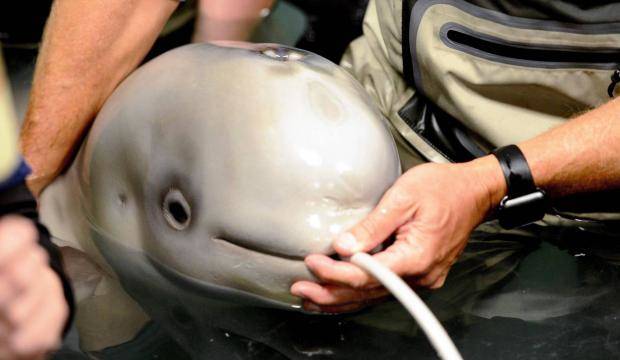Tyonek, a Cook Inlet beluga that has been under 24/7 care from experts at the Alaska SeaLife Center in Seward, will not be released back into the wild, according to NOAA Fisheries.
NOAA has determined that the male beluga whale calf, which was found stranded on the Cook Inlet mud flats in September 2017, is not capable of surviving on his own, according to a release.
According to experts from NOAA Fisheries’ Marine Mammal Health and Stranding Repsonse Program, the calf less than one month old when he was stranded.
“He is nutritionally and socially dependent, lacks both survival and socialization skills needed to be successful on his own in the wild, and it is likely his mother either abandoned him or died,” the release said. “The calf also experienced a collapsed lung—a condition which may recur and compromise survivability in the wild by limiting his ability to dive.”
The calf has been under constant care at the Alaska SeaLife Center for over three months with the help of partner aquariums, including the Georgia Aquarium, Mystic Aquarium of Connecticut, SeaWorld, Shedd Aquarium and Vancouver Aquarium.
“Tyonek has pulled through to become the first rescued Cook Inlet beluga calf to survive,” said NOAA Fisheries Assistant Administrator Chris Oliver. “Although he cannot be released into the wild, he will continue to receive the care needed to thrive, and help us learn more about this iconic species.”
A decision will be made about Tyonek’s placement over the course of the next few weeks, according to the release.
“Once that decision is made, NOAA will work with the recipeient facility to expedite the calf’s transportation and transition so that he can be integrated into a social group where he can thrive with other whales,” the release said.
In 2012, a newborn beluga whale found in Bristol Bay died at the SeaLife Center about a month after it’s rescue.
NOAA scientists estimate the the population for Cook Inlet beluga whales is most likely around 328 animals.
Reach Kat Sorensen at kat.sorensen@peninsulaclarion.com

